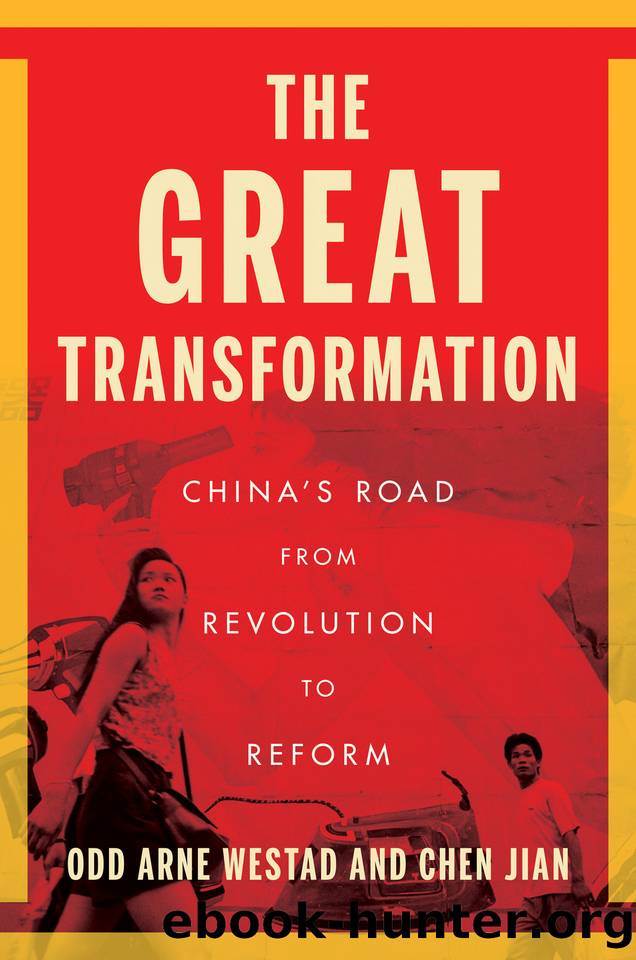The Great Transformation by Chen Jian & Westad Odd Arne

Author:Chen, Jian & Westad, Odd Arne
Language: eng
Format: epub
Publisher: Yale University Press
Published: 2024-09-24T00:00:00+00:00
9
Imagining the World
ON JANUARY 28, 1979, Deng Xiaoping boarded a plane for his first trip to the United States. He was in very high spirits. A few weeks earlier, at its Third Plenum, the CCP Central Committee had agreed to a set of reform plans that Deng was seen as the prime promoter of. The Third Plenum had made him the most powerful leader of the Party, more powerful, even, than its chairman, Hua Guofeng. Almost at the same time, the PRC and the United States finally established diplomatic relations. Deng saw these two events as linked. The United States, Deng Xiaoping thought, could play a central role in Chinaâs reform plans and in his own political ascent. Deng was not a talkative person, especially when he was among his close advisers. Yet, during the long cross-Pacific flight, he at times spoke a lot, and spontaneously. Several of those who were on the plane with him recall him talking about the long-term relationship between the United States and China. âAs we look back, we find that all those countries that were with the United States have become rich, whereas all those against the United States have remained poor. We shall be with the United States.â1
For Deng and everyone in the CCP leadership, the years since Maoâs death and the October 1976 coup had been a massive exercise in finding their own way forward, not just in domestic policy but in international affairs as well. Within China, they had not only broken with Maoâs Cultural Revolution policies but also had arrested his widow and other members of his family, as well as his most valued comrades. Internationally, they had moved ahead with closer relations with the United States, as well as with Japan and western Europe. With Mao gone, there had been CCP leaders who had argued for at least a stabilization of relations with the Soviets, just like there had been those who believed that a return to Soviet-style central planning was the solution to Chinaâs economic ills. But Deng was not among them. To a surprising degree, Deng had taken over Maoâs general view of the world. In his estimation, the Soviet Union was an implacable enemy of China. It was also an imperialist superpower on the rise, with an endless appetite for territorial conquest built into its revisionist ideology. It could serve neither as foreign friend nor as an economic model for China, Deng insisted.2
Most CCP leaders agreed with Deng, though there had been dissenting voices, especially in the immediate aftermath of the 1976 coup. The disagreement was not so much about policy toward the Soviet Union. Almost all Chinese leaders saw returning to Sino-Soviet friendship as an impossibility. But quite a few leaders, particularly those in charge of the economy, viewed their task as reinvigorating and strengthening the planned economy after what they saw as the chaos of the Cultural Revolution. They wanted Soviet-style economic planning, but better and without direct association with the Soviets. Leaders such
Download
This site does not store any files on its server. We only index and link to content provided by other sites. Please contact the content providers to delete copyright contents if any and email us, we'll remove relevant links or contents immediately.
| Central Asia | Southeast Asia |
| China | Hong Kong |
| India | Japan |
| Korea | Pakistan |
| Philippines | Russia |
The Sympathizer by Viet Thanh Nguyen(4384)
The Rape of Nanking by Iris Chang(4202)
World without end by Ken Follett(3473)
Ants Among Elephants by Sujatha Gidla(3460)
Blood and Sand by Alex Von Tunzelmann(3194)
Japanese Design by Patricia J. Graham(3163)
The Queen of Nothing by Holly Black(2586)
City of Djinns: a year in Delhi by William Dalrymple(2547)
Foreign Devils on the Silk Road: The Search for the Lost Treasures of Central Asia by Peter Hopkirk(2454)
India's Ancient Past by R.S. Sharma(2450)
Inglorious Empire by Shashi Tharoor(2436)
Tokyo by Rob Goss(2427)
In Order to Live: A North Korean Girl's Journey to Freedom by Yeonmi Park(2377)
Tokyo Geek's Guide: Manga, Anime, Gaming, Cosplay, Toys, Idols & More - The Ultimate Guide to Japan's Otaku Culture by Simone Gianni(2360)
India's biggest cover-up by Dhar Anuj(2349)
The Great Game: On Secret Service in High Asia by Peter Hopkirk(2329)
Goodbye Madame Butterfly(2249)
Batik by Rudolf Smend(2179)
Living Silence in Burma by Christina Fink(2059)
